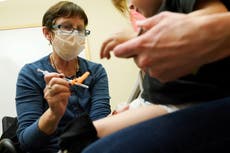UK speeds up plans to develop mRNA vaccines for cancer patients with BioNTech deal
Deal follows UK’s largely successful Covid vaccine roll out
Cutting-edge research into developing personalised mRNA vaccines for cancer patients will be accelerated following the UK’s successful Covid-jab rollout.
BioNTech, the German firm that co-produced a Covid vaccine with Pfizer, will partner with the government to deliver 10,000 personalised therapies to patients in the UK by 2030.
Under the plans, cancer patients will get early access to trials exploring personalised mRNA therapies, including cancer vaccines. Such vaccines will contain a “genetic blueprint” to stimulate the immune system to attack cancer cells.
Current treatments for cancer, such as chemotherapy and radiotherapy, can attack healthy cells as well as cancerous ones, resulting in adverse side effects and illness.
The cancer trials could start by the second half of this year.
Access to the trials will be through the Cancer Vaccine Launch Pad which is being developed by NHS England and Genomics England.
The launch pad will help to rapidly identify large numbers of cancer patients who could be eligible for the trials and explore potential vaccines across multiple types of cancer.
The partnership will aim to help patients with early and late-stage cancers. If successfully developed, cancer vaccines could become part of standard care.
In 2019, there were 327,174 new cases of cancer diagnosed in England. Incidence rates rose between 1995 and 2013 but have fallen slightly since then, according to figures from the House of Commons library.
Incidence is 23 per cent higher in men than in women, the research said. There is still no cure for the disease.
BioNTech said it plans to invest in a UK Research and Development hub in Cambridge “with an expected capacity of more than 70 highly skilled scientists”.
Steve Barclay, the health secretary, was due to sign a memorandum of understanding with BioNTech on Friday.

He said: “BioNTech helped lead the world on a Covid-19 vaccine and they share our commitment to scientific advancement, innovation and cutting-edge scientific technology, making them perfect partners for a deal to work together on cancer vaccines.
“This partnership will mean that, from as early as September, our patients will be among the first to participate in trials and tests to provide targeted, personalised and precision treatments using transformative new therapies to both treat the existing cancer and help stop it returning.”
He added: “This agreement builds on this government’s promise to increase research and development spending to £20 billion per year and demonstrates the UK remains one of the most attractive places in the world for innovative companies to invest in research, trial new treatments and treat patients more effectively.”
Professor Ugur Sahin, managing director, CEO and co-founder of BioNTech, said: “The UK successfully delivered COVID-19 vaccines so quickly because the National Health Service, academia, the regulator and the private sector worked together in an exemplary way.
“This agreement is a result of the lessons learnt from the Covid-19 pandemic as we all experience that drug development can be accelerated without cutting corners if everyone works seamlessly together towards the same goal. Today’s agreement shows that we are committed to do the same for cancer patients.”
Join our commenting forum
Join thought-provoking conversations, follow other Independent readers and see their replies
Comments


Bookmark popover
Removed from bookmarks